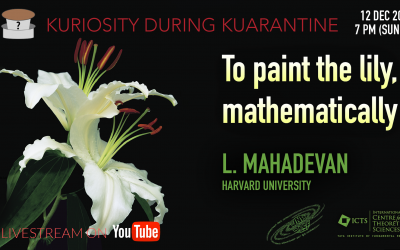Picture Credit © Dilip Rawal
Abstract of the Talk :-
A walk in the garden reveals a remarkable diversity of living forms, leading Darwin to exclaim that they "might drive even the sanest man mad.” I will argue that there is perhaps a method in the madness, that comes into focus by combining the lenses of biology, mathematics and physics. Along the way, I hope to convince you that the everyday world is a rich source of mystery and magic that gradually leads to mathematics - the mundane provides a perennial path towards the sublime!
About the Speaker :-
L Mahadevan was born in India and educated there through college. He then moved to the USA for graduate school, eventually getting his PhD at Stanford University. He started his independent career at MIT, and was then the inaugural Schlumberger Chair in Complex Physical Systems at Cambridge University and a Professorial Fellow at Trinity, before coming to Harvard University, where he has been since 2003.
His work attempts to understand motion and matter at the observable scale of ‘middle earth’, a playground of rich phenomena that are easy to observe, yet not always easy to explain. Areas of interest include the patterns of shape and flow of inanimate matter on scales ranging from the supramolecular to the planetary, and the dynamics of sentient living matter that can self-organize, perceive and act. In all cases, the aim is to get at a qualitative understanding using quantitative methods, and get at general principles, if there be such, from answers to specific questions. His publications range over such subjects as the shape and flow of fluids and soft materials, the morphogenesis of cells and organs, the movements of plants and animals, and the physiology and behaviour of organisms at both the individual and collective level.
His work has been recognized by awards that include fellowships from the Guggenheim Foundation (2006-07), the Radcliffe Institute (2014-15), the Simons Foundation (2021- present) and visiting professorships at Oxford, Ecole Normale Superieure (Paris), Berkeley and MIT. He is a MacArthur Fellow (USA) and a Fellow of the Royal Society (of London).



